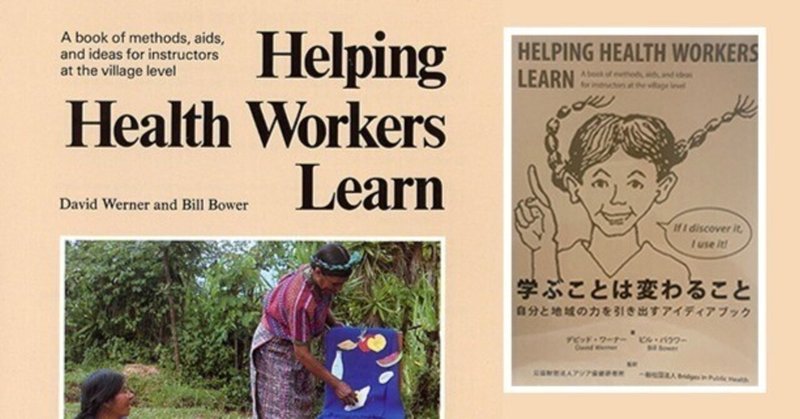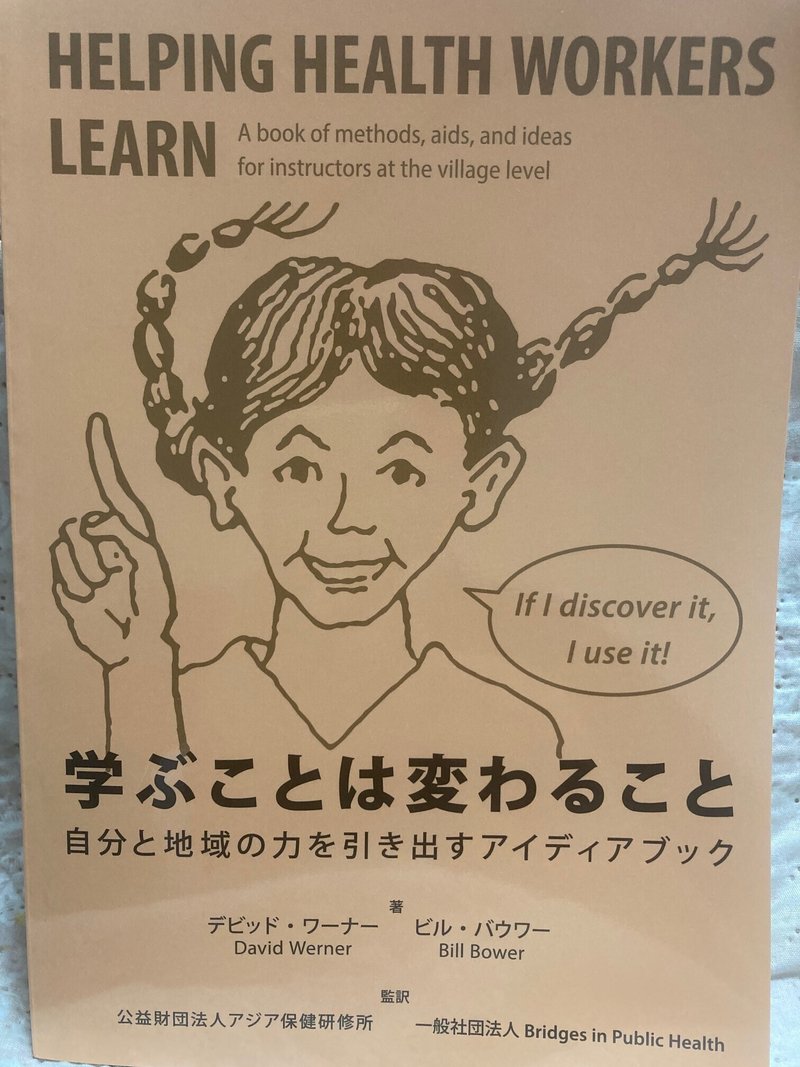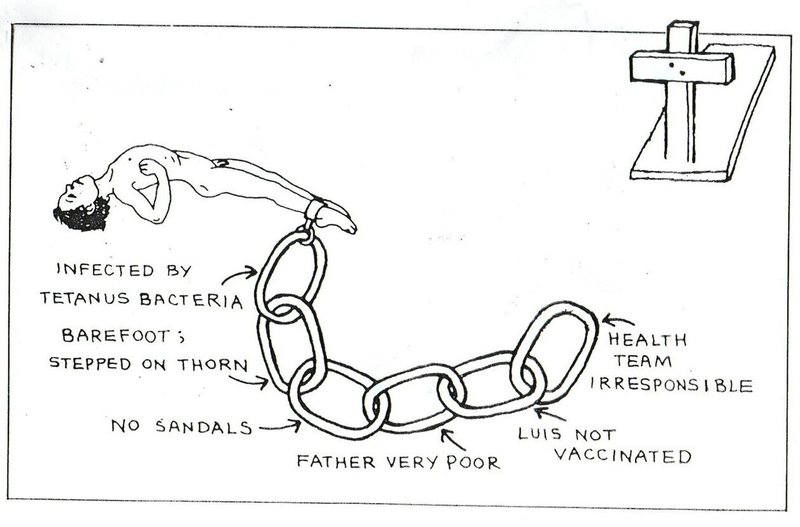
名著紹介 『学ぶことは変わること ― 自分と地域の力を引き出すアイディアブック』 (アジア保健研修所、Bridges in Public Health監訳) 《Dr.本田徹のひとりごと(84)2023.6.9》
『学ぶことは変わること ― 自分と地域の力を引き出すアイディアブック』 (アジア保健研修所、Bridges in Public Health監訳)
原著 “Helping Health Workers Learn” by David Werner and Bill Bower
Its Superb Japanese Translation has just arrived thanks to AHI and BiPH
NGOシェアにとってエチオピア以来40年近くにわたり、地域保健活動の確かな拠り所となり、1990年から2000年代にかけて、東北タイで工藤芙美子さんたちを中心に村々で展開された下痢予防やHIV/AIDS予防啓発活動においても、欠かせない、大切な手引書となってきたのが、この “Helping Health Workers Learn” (保健ワーカーたちの学びを助けること)でした。シェアが中心になって翻訳・出版にこぎつけた『医者のいないところで』(”Where There Is No Doctor”)とともに、『学ぶことは変わること』は、国内外での草の根医療・保健活動の、尽きない源泉となってきました。実際二冊の本は、医療と教育という2つの側面で、姉妹のような関係にあり、互いに補い合っています。
“Helping Health Workers Learn” (HHWL), this inspiring book on Primary Health Care and Health Education has been tremendously important for our community activities in North-East Thailand (Isaan) during 1990s-2000s, for the community-based Diarrhea Control Project and ensuing HIV/AIDS Project led by Ms. Fumiko Kudo (registered nurse/tropical medicine expert) and village health volunteer teams.
Two books by David Werner, preceding one is entitled “Where There Is No Doctor” (WTND), which was translated and published by SHARE more than a decade ago, and this HHWL recently translated into Japanese by AHI/BiPH are mutually indispensable texts and strengthen and supplement with each other. What you have learned and practiced through WTND, you could apply and share with people and co-workers by utilizing HHWL in the community.


この画期的な本が、このたび、愛知県に本部のある2つのNGO、アジア保健研修所(Asian Health Institute)とBiPH(Brides in Public Health)の、2年にわたる周到な準備と献身的な努力により、立派で読みやすい日本語版となって出版されました。私は個人的にも、2つの団体の快挙をよろこび、また感謝の気持ちでいっぱいです。
本書は紙の本としても、PDF版のデータでも入手可能とのことです。(詳しい入手方法などは、下記AHIのホームページをご覧ください)
I am personally very pleased and appreciative that this epoch-making resource book was finally made available in readable Japanese by joint and persistent efforts of AHI and BiPH. The book can be purchased both in printed book format and PDF data. Please refer to the following AHI website to get a copy.
健康づくりの地域活動を通して、社会変革を目指すという意味では、この本は野心的なものでもありますが、そのことをデビッドさんは、序文の、「なぜ私たちは政治的にならざるを得ないか」という文章の中でまとめています。
西部メキシコの山間僻地では、病気の原因は本人や家族のせいというよりは、人間関係や社会関係によって規定されていることが多く、貧しい小作民や家族の努力では病気の予防や治療はいかんともしがたいものであったことを、実例を挙げて著者は説明しています。とくに土地の支配権によって、「持つ者」は一層持つようになり、「持たざる者」は、わずかに持っているものすら、奪われていくという厳しい現実に、若きデビッドは直面します。今では「健康の社会的決定要因」と呼ばれるようになった、SDGs(持続可能な開発目標)につながる考え方に、いち早く気づき、そのことを地域での保健活動に欠かせない視点として、デビッドは言あげしているわけです。
Achieving social reform and social justice through community health activity seems to have been David and his team’s distant and ambitious dream. In the preface entitled “Why this book is political”, David convincingly explains why he and his friends had to be ‘political’. In poor mountainous community in the Western Mexico of Sierra Madre, where human relations and social fabric based on the land ownership have decided almost everything including health issues; who will be prone to sickness and who can get access to proper health care. Local landlords who possess much of the farm lands and forests can get richer and richer whereas poor landless peasants, those ‘have-nots’ are prone to be stripped of even what meager land they own. David had a clear eyesight to take notice, as early as 1970s, on ‘Social Determinants of Health’, today’s buzzword and something amenable to SDGs.

Ajoya clinic for PHC around 1968 - Young David tenderly bandaging a young girl with arm wound. A clinic full of life and gaiety – ‘life symphony
デビッドたちの運動は、あくまで非暴力的なものでありながら、社会正義や公正を求める主張が大地主など地元の既得権者からの、強い干渉や圧力にさらされるようになります。地主が雇ったギャングによる、耕作地や森からの追い立てや、小農民や保健ワーカーへの虐待・拉致・殺害、世界的なアグロビジネスや麻薬密売組織の跋扈(ばっこ)などによる地域の破壊、住民の流亡化が、1992年のNAFTA(北米自由貿易協定)締結前後に続きました。デビッド自身も脅迫を受け、辛い日々を送ることとなります。そうした試練の中で生まれた本書は、その母胎となり、PHCや地域リハビリテーション(CBR)の先駆的なモデルとなったアホヤ村が衰退した後も、残された貴重な記録・証言・教訓として、いまも燦然として、あとに続く者たちの道を照らしています。
Although health promoting activities by David and his team in Mexico were purely non-violent, their tenet for social justice and human-rights angered those landlords with vested interests and the team was exposed to threats and physical violence. Some of them actually fell victim to abduction and murder. NAFTA (North American Free Trade Agreement) signed and went into effect by USA, Mexico and Canada in 1992-94 was a blessing for global agribusiness and was a bad omen for countless poor farmers in Mexico. Trans-American narco-business and so-called ‘drug war’ during 90s also became a harsh blow for villagers and health workers in Ajoya that once was a cradle for comprehensive PHC and Community-based Rehabilitation (CBR), Eventually many people were forced to leave the community for their own safety or for employment.
That was a sad and tragic history but resource books that David and his colleagues left behind as precious accomplishment, such as‘Helping Health Workers Learn’ and ‘Disabled Village Children’ still remain a beacon that guide us and shed light on our path toward true PHC and CBR.
NGOシェアにとって、本書がこれまでの地域保健活動での教材としていちばん役立ったと思われる実例は、第26章「人間関係が健康に与える影響に注目する」で紹介されている、「ルイスの物語」です。これは、デビッドが実際に見聞した、メキシコの僻遠の山村で起きた事件で、働き者の7歳の子どもルイ君の、破傷風による死を通して、医療をめぐる社会や人間関係の仕組みがうまく機能しないとき、いかに小さな間違いが「連鎖」のようにつながり、取返しのつかない悲劇に発展するかが、「でもなぜ(But Why)」のたたみかけるような問答を、ファシリテータと参加者が交わす中で、明らかにされていきます。全員の緊張と集中力が高まり、すぐれた臨場感をかもしだし、問題の深刻さが浮き彫りにされ、参加者一人ひとりが、「わがこと」として、この悲劇を体感するようになります。この保健ゲームはデビッドが、2009年に『医者のいないところで』が翻訳出版された機会に、シェアの招きで日本を訪問されたとき、上野の事務所でも実演していただき、多くのスタッフが感銘を受けたものでした。皆さんにもぜひこのけなげな少年の、短かった悲劇の生涯をたどっていただき、どうすればこのような悲しい出来事を予防できるのか、この本を通して学んでいただきたいと思います。
For NGO SHARE, the best example of how this book can be made useful in the workshop or in school education setting is “the story of Luis” in “Chapter 26: Looking at How Human Relations Affect Health”. This is a tragic event that actually happened in a remote village in Western Mexico. A 7-year-old boy called Luis stepped on the thorn while he carried a bucket of leftover food to pig pen. When society and human relations don’t work well for health care, small lapses and errors can lead up to a tragic outcome like death of a boy in a vicious circle. Question & answer session of “But Why” between facilitator and participants is a thought- provoking process in which everyone is awakened and heightened in their attention to the real cause of death of the child. Eventually they will find that the boy’s death is something that could occur to their own child and feel deep sympathy to Luis and they will try to find a way how such tragic event can be prevented from happening again.

Tragic Death of boy Luis – Chain of causes
最後に、この本を今の日本で翻訳出版することの意義について、すこし書いておきます。この点については、翻訳チームの主力を担ったAHIの清水香子さんの序文「日本語版の出版にあたって」に的確に説明されているので、以下に引用いたします。
「・・・私たちはこの翻訳を、日本の各地域で、取り残されている人びとに目を向け共に生きようと活動する方たちに、自分と世界・社会を考える場づくりをすすめる開発教育に関わる方たちに、手に取っていただきたいと思っています。そしてともに学び合いながら、社会を変えるつながりを、分野を超えてつくっていきたいと思っています。」
清水さんの文章に私も全面的に共感しますが、とくに、「分野を超える」ことの大切さは強調しすぎることはないと考えます。日本が超高齢社会になったからこそ、健康や福祉の分野でも、垣根を越えてさまざまの職種の人たち、普通の市民、子どもまでもが、協力し合い、支え合う仕組みづくりが急がれるのでしょう。そういう意味では、私たちが長年関心をもって協力し合い、交流を続けてきた東北タイの市民社会組織HSF(Health SHARE Foundation)とその仲間たちである保健ボランティアたちによる、縦割りでない、老若男女、障害を持つ人たちもそうでない人たちも隔てなくまじりあい、支え合って暮らす、真にインクルーシブなコミュニティへの模索は大変貴重でもあり、私たち超高齢社会日本にとっての教訓は大きいと思います。
恐らく、デビッドたちがメキシコの村で1980-90年代に進めてきた、障害者が差別されずに保健活動の担い手となって、車の両輪のように、PHCとCBRを展開していくアプローチから多くを学ぶことができ、その意味でもこの本の応用範囲は広いと言えます。
皆さまのそれぞれに暮らし、働く地域で、是非このすぐれた書物を座右に置き、活用していただきたいと、切に希望します。
Lastly, I would like to touch upon the meaning of translating and publishing this book in Japan today. In that respect the preface by Ms. K. Shimizu is very pertinent and I would like to cite what she says below;
“We would like to invite those who turn their attentive eyes on people who are left behind and try to live with them and also those who promote development education as a platform to think about ourselves and the world/society to pick this book up and make good use of it. I hope they will learn and share what is in the book with one another and to establish network of relationship and solidarity among them in order to change the society by transcending all the boundaries.”
I quite agree and sympathize with what Shimizu-san has to say, especially what she means by “transcending all the boundaries”. Because we live in a super-aged society here in Japan, all the more we need to transcend all the boundaries and to cooperate hand in hand with each other, especially in the field of health care and social welfare. In that respect what we can learn from Thai NGO HSF (Health SHARE Foundation) is immense. At the community level, the team HSF tries to break the vertical division and transcend boundaries between people with disability and ‘without’, and between aged and young, between PWAs and non PWAs, etc.
I guess that what David and his friends in Mexico had achieved during 1980s to 1990s by creating two-wheeled activities of PHC and CBR where people with disability and ‘without’ fully co-worked and served as best as they could for the community. They certainly transcended all the boundaries and became full-fledged players for health.
I sincerely wish many Japanese, young and old, wherever they live and work, group up together and put this book on the left side of your table and read, absorb, discuss and use it on everyday basis.

Funny David caressing the wall painting jugar that was drawn by Ajyoya villagers in appreciation to him
この記事が気に入ったらサポートをしてみませんか?
